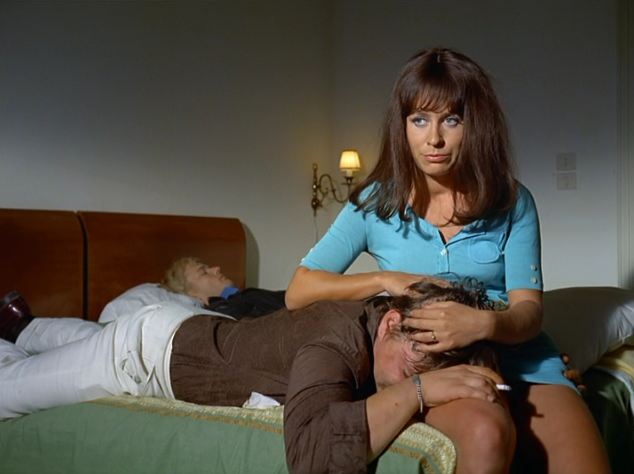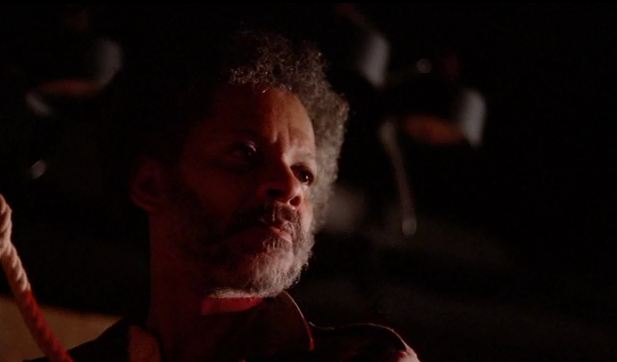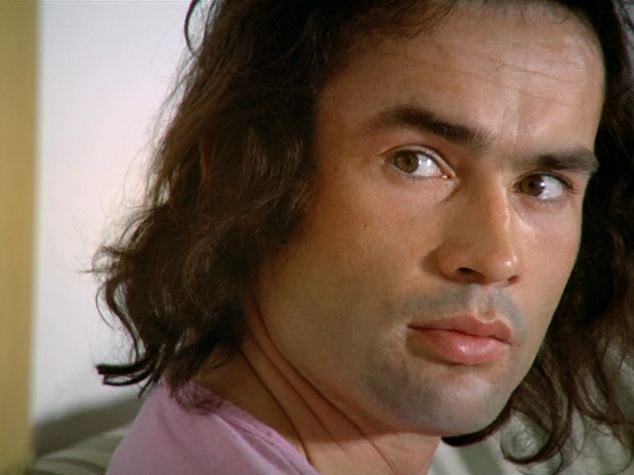Amon Duul ii in The Niklashausen Journey
One of the undoubted highlights of Rainer Werner Fassbinder's The Niklashausen Journey (1970) is a free-spirited jam from Krautrock pioneers, Amon Duul ii. The band, who sound pretty much the same today as they did back then, were true revolutionaries. It's at the moment that Amon Duul ii appear in this movie that we know we are dealing with montage, as opposed to narrative, and it's this jam seession that will probably oblige you to give in to the idea that in this film, not a lot of it is going to make traditional sense. This scene follows a very strange and rather elementary Marxist lecture, delivered in an empty quarry.
Michael König in The Niklashausen Journey
Michael Konig appears in the distance, in Rainer Werner Fassbinder's The Niklashausen Journey (1970). He's among a group presumably listening to some revolutionary preaching, the sort that is unfortunately very easy to switch off from. He is monotonously beating a drum while the camera moves at a snail’s pace towards what are to begin with stick figures outside a kirk, at the top of a double set of stairs. It isn’t a terribly well composed shot, and it is quite some time before we become aware of Konig’s stunning hair – a show stealing mane if ever there was one – and very reminiscent of many of the rock stars of the age. It’s time to switch off if you are anything other than a Fassbinder die-hard.
Walter Sedlmayr in The Niklashausen Journey
There are lectures of different sorts in The Niklashuasen Journey (Rainer Werner Fassbinder); some political, some social, and some religious. Maybe it’s not good cinema, or maybe it is; it’s hard for us to answer that question because so few of us are going to get the chance to see this on the big screen. There is a crucial difference between watching this in such an environment and on DVD, where we are generally alone in our home or in a couple; and the cinema, which is a shared experience, which is more difficult to leave. We would perhaps enjoy the oratory more, such as is delivered in Niklashauser Fart by Walter Sedlmayr.
Margarethe von Trotta in Beware of a Holy Whore
Babs, the production assistant, who sets the entire tone of the film in the first shot, with her bored and laconic bitching about the others (‘this place is crawling with gays’) is played by Margarethe von Trotta — cast as a typical period Chelsea Girl, a glamorous young and idle person. Somehow, Fassbinder feels, what we should be seeing is hard work, because that is what it takes to make films; and yet all we have is indolence, punctuated with an undisguised sexuality that pops to the surface in every character, whether they like it or not.
Bob Dorsay in In a Year of 13 Moons
What happens in empty office buildings in West Germany in 1978? People go there to kill themselves. Elvira’s journey through the building is quite condensed, but one feels that she could go on a lot longer, having Franz Kafka like adventures in endless empty rooms.
Rudolf Lenz in Effi Briest
Austrian actor Rudolf Lenz (1920–1987) wears a face that I am sure I have seen outside German cinema, and yet I still cannot place it. Even with the benefit of the Internet Movie Database, I am still sure that I have seen him elsewhere, but the more I consider it the more that I think I may have perhaps enjoyed him so much in World on a Wire that I have imagined him to have a had a wider career than he did.
Werner Schroeter in Beware of a Holy Whore
Nobody much savaged Disney back in the day, because none of their world-offending tendencies had really manifested themselves yet; not quite in the eyes of some however. Deiters, Fotograf (as Werner Schröter) who commences Beware of a Holy Whore, offers a beguiling speech, which will initially tell a viewer; if the rest of the film is going to be like this, we are in for an awful evening. And largely: what the hell does this have to do with anything at all?
Peter Chatel in Satansbraten
In Satan's Brew (Satansbraten 1976) Kurt Raab reaches his funniest when his insanity clashes with his sexuality, and he is obliged for the sake of his impersonmation of Stefan George to be gay.
Barbara Valentin in Effi Briest
Barbara Valentin (1940 – 2002) could be the star turn in Fassbinder's Effi Briest, for several reasons, the least of which her good looks, her acting and her singing voice. But in this Fassbinder dubfest, I’ll have to decide later if that is really her singing or not. Also, she is dead sexy, very difficult in C19th Prussia, and this elevates her character Marietta Tripelli, the singer, into something special.
Peter Kern in The Wrong Move (1975)
I’m one of those not convinced by the work of Wim Wenders. It’s not easy to say how many of his films might be said to be good, while probably none of them are great; and yet his name is still well known, although this is likely because he came to America when he did and made a name for himself under the tutelage of Francis Ford Coppolla.
Hannes Fuchs in Beware of a Holy Whore
In Beware of a Holy Whore, Hannes Fuchs plays David, a sound technician on the film set, and a fairly typical period wastrel. Most of the cast and crew (including him) are homosexual, but the other string to his bow is that he is freely spouting the counter-cultural political nonsense we know must have been spouted widely in the era.
Herbert Steinmetz in Effi Briest
The subtitle to Fassbinder’s Fontane Effi Briest is: ‘many people who aware of their own capabilities and needs, yet acquiesce to the prevailing system in their thoughts and deeds, thereby confirm and reinforce it’; which is a fairly sound anti-Bourgeois principle an one that may apply to many a Fassbinder production.










